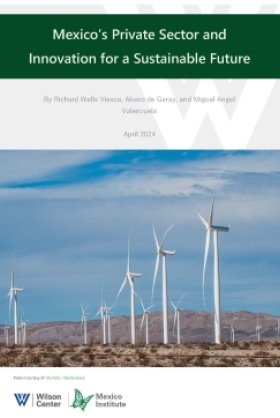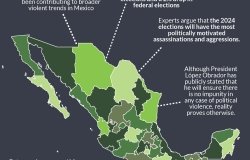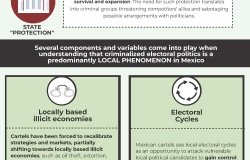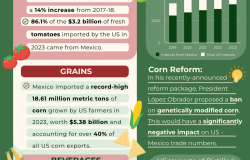El Palenque Summary: The Mexican View on Bilateral Relations
Last week in conjunction with El Palenque, a well-known and widely consulted discussion forum on the Animal Politico website, the Mexico Institute posted a question to the Palenqueros concerning the major challenges and opportunities facing the United States-Mexico relationship. This is the first of what we hope will be a long-term collaboration with Animal Politico, which will also carry a Spanish language blog from the Mexico Institute, titled “La Vista desde DC.” Here we present a summary of the views and opinions presented in the forum.
Translated by Ashley N. Garcia, Staff Intern for the Mexico Institute
Last week in conjunction with El Palenque, a well-known and widely consulted discussion forum on the Animal Politico website, the Mexico Institute posted a question to the Palenqueros concerning the major challenges and opportunities facing the United States-Mexico relationship. This is the first of what we hope will be a long-term collaboration with Animal Politico, which will also carry a Spanish language blog from the Mexico Institute, titled “La Vista desde DC.” Here we present a summary of the views and opinions presented in the forum.
Migration:
The debate surrounding Obama’s migration reform is centered on the nature of the debate as a U.S. domestic issue rather than bilateral or international policy. In many instances, the participants expressed that Mexico should stay away from the issue because direct involvement could provoke a reaction by the Republican Party against an immigration reform. On the other hand, other participants asserted that Mexico should take a moderate role given the impact of immigration in both countries.
“Two important issues on Obama’s agenda in his second term are immigration and gun control reforms. The Mexican government must be very careful in the way it lobbies. These two issues are domestic agenda items and respond to domestic political needs. In other words, the White House does not promote these reforms as part of a bilateral issue or to help Mexico. For this reason, Mexico cannot appear too pushy with regard to the issue because it could alienate some conservative groups that Obama needs to attract and that could easily turn away if they perceive too much insistence from Mexico. “- Javier Garza (Editorial Director, El Siglo de Torreón)
“I sincerely hope that we do not waste time on the immigration reform. This is an internal matter for the U.S. and, on the other hand, would only encourage the migration of workers seeking opportunities that we can offer. The emphasis in the relationship should be to create conditions that favor investment in our country and the creation of jobs, as well as open doors to major U.S. universities to expand educational opportunities. “- Victor Beltri (Analyst and Political Consultant)
Security:
The discussion surrounding security mainly critiques the current gun policy in the United States, specifically how U.S. gun policy has affected Mexico, and how violence is now associated with Mexico. One of the participants expressed a pessimistic outlook towards a more progressive gun policy. A debate ensued over whether United States should consider violence in Mexico as part of a gun policy reform, while others asserted that Mexico should not interfere in the U.S.’s domestic laws.
One participant believed that Plan Merida will initiate a second phase where the U.S. support funds will be distributed among the municipalities and states instead of the federal government.
“The Merida Initiative could go into a second phase— one with direct support to states and municipalities that can be used to strengthen local police. It will be different from the one used during the past six years where most of the money was given to the Federal Government.” – Javier Garza (Editorial Director, El Siglo de Torreón)
“The biggest challenge for Mexico is to once again become relevant to the people and government of the United States in ‘constructive’ matters. Today the vast majority of Americans, according to the consulting Via Novo, associate the word ‘Mexico’ with drugs, poverty, violence, insecurity, corruption, danger. “- Carlos Heredia Zubieta (Director of the Division of International Studies, Center for Research and Teaching in Economics (CIDE))
“I was offended by President Barack Obama’s silence on the smuggling of weapons into Mexico. A lot of blood has been shed by weapons that have been smuggled across the border due to the indifference of U.S. authorities and corruption of Mexican customs. The silence is equally as aggressive on behalf of the Mexican authorities who do their best to not disturb the United States. The Mexican victims of arms smuggling have few defenders among the elites of the two countries. “- Sergio Aguayo (Professor, Center for International Studies, El Colegio México)
Economy:
Overall, there was a negative outlook towards economic projects between the United States and Mexico. In many instances, participants expressed how Obama’s new policies will be focused on domestic growth rather than in trade between U.S. and Mexico.
However, some people did offer suggestions. In one case, a participant suggested that the United States should support conditions that favor investment and the creation of jobs in Mexico. Another participant expressed that it will be challenge to fight those who support and protect domestic growth in the United States and the local production of goods. He believes this could affect Mexico’s economic growth and exportations to the U.S.
“A major challenge in economic matters is to fight those who propose and promote the growth of the U.S.’s domestic market through measures that protect local producers, and complicate the growth of Mexico through our exports to the United States.” – Juan Ignacio Gil Anton (Director of Corporate Insurance, GNP).
Related Program

Mexico Institute
The Mexico Institute seeks to improve understanding, communication, and cooperation between Mexico and the United States by promoting original research, encouraging public discussion, and proposing policy options for enhancing the bilateral relationship. A binational Advisory Board, chaired by Luis Téllez and Earl Anthony Wayne, oversees the work of the Mexico Institute. Read more







